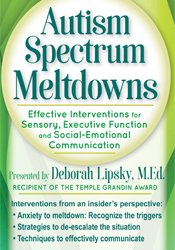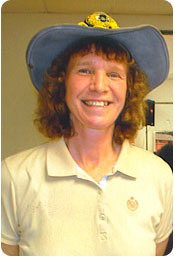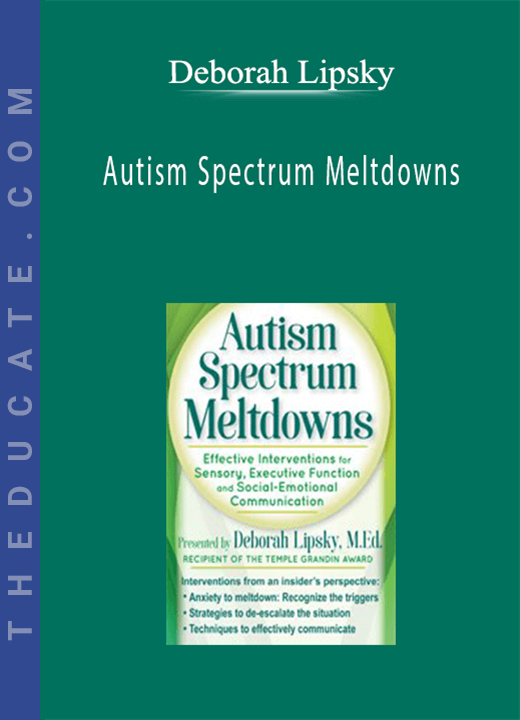Description

-
Deborah Lipsky – Autism Spectrum Meltdowns: Effective Interventions for Sensory, Executive Function and Social-Emotional Communication
- Faculty:
- Deborah Lipsky
- Duration:
- 5 Hours 58 Minutes
- Format:
- Audio and Video
- Copyright:
- May 03, 2018
- What causes the unusually strong reactions of a meltdown?
- Can you see it coming?
- Is it a meltdown or a tantrum?
- Is it willful, manipulative behavior?
- Is ‘Fight or Flight’ the only option?
- Sensory and Visual Environments
- Sensory evaluation: Asking the right questions
- Large motor skills, fine motor skills, eating, hearing, smell, touch
- Creating a sensory friendly environment
- Impact of sensory dysfunction on learning, behavior and social interaction
- Executive Function (EF)
- Impact of EF on daily life
- EF manifestations seen in meltdowns
- Strategies to limit consequences of EF
- Social/Emotional Communication
- Common pitfalls in communicating with individuals with autism
- Communication differences with autism
- Impact on learning, behavior and social interaction
- Strategies to help facilitate communication
- Recognizing the triggers
- What does a meltdown look like?
- What a person with autism experiences during a meltdown
- Common behaviors seen in meltdowns
- Meltdown or tantrum?
- Behavior as a form of communication
- Inappropriate interventions … What never to do
- Appropriate strategies to de-escalate the situation
- Intervention in the school system
- Creating a personalized intervention/crisis plan
Description
Individuals on the autism spectrum often react very strongly to seemingly minor changes in routine, patterns, food, clothing, noise, and a host of other environmental factors. Understanding and recognizing personal triggers will be a major benefit in developing a plan for yourself or individuals you work with to lower the levels of anxiety and avoid a catastrophic reaction.
Deborah Lipsky, M.Ed., presents a rare and unique perspective from someone who lives with autism every day. Through a combination of personal experiences with professional knowledge she will offer you a rare glimpse into the neurological processing differences of an individual with autism and explain the physical and mental processes of a meltdown. You will participate in interactive exercises where you are “autistic” for a moment to gain a greater appreciation of the challenges individuals with autism face. You will learn how to recognize the differences between a meltdown and a behavioral tantrum and what can trigger a meltdown. You will walk away with effective intervention strategies to use before, during, and after a meltdown.
Handouts
| Manual (2.14 MB) | 27 Pages | Available after Purchase |
Outline
The Neurological and Physiological Differences of Autism
Anxiety to Meltdown
Effective Behavioral Interventions Based on the S.C.A.R.E.D. Model
Faculty

Deborah Lipsky, M.Ed. Related seminars and products: 3
Board Member
Autism Society of Maine
Deborah Lipsky, M.Ed., is an accomplished presenter traveling the United States and Canada delivering seminars, presentations, workshops, and keynote addresses on understanding autism from an insider’s viewpoint. In 2005, she was awarded the Autism Society of Maine’s outstanding volunteer award, and in 2006, she became the recipient of the Temple Grandin award for “outstanding success in her life thereby being an inspiration to others.”
Mrs. Lipsky became an international bestseller with Managing Meltdowns (2010), a book based on her S.C.A.R.E.D. model, an intervention guide full of strategies to help first responders and anyone witnessing an individual with autism having a catastrophic reaction (meltdown). In her second book, From Anxiety to Meltdown (2011), the focus is on understanding anxiety and how it influences thoughts and behaviors in individuals on the spectrum. It also is the first book to truly distinguish the difference between tantrums and meltdowns and offers numerous strategies to deal with both. Mrs. Lipsky also wrote a chapter on learning social skills from animals and is featured on the cover of the book “Autism All Stars”, edited by Josie Santomauro and published by Jessica Kingsley Publishers. Her third book on the nature of demons and spiritual warfare was released by Tau Publishers in the fall of 2012. Mrs. Lipsky’s fourth book, How People with Autism Grieve, and How to Help (2013), is an honest, first-hand account of how people with autism deal with the loss of someone in their life.
Mrs. Lipsky has been featured in a documentary along with Temple Grandin called, “Making Our Way” which was produced for Maine Public Broadcasting Television by Dan Lambert. In 2015 the documentary about her life, “Living with Autism”, also produced by Dan Lambert, was released and is available on DVD.
Speaker Disclosures:
Financial: Deborah Lipsky receives royalties as an author for Jessica Kingsley Publishers. She receives a speaking honorarium from PESI, Inc.
Non-financial: Deborah Lipsky is an adult with high functioning autism. She is a member of the Autism Society of Maine.






4 reviews for Deborah Lipsky – Autism Spectrum Meltdowns: Effective Interventions for Sensory, Executive Function and Social-Emotional Communication
There are no reviews yet.